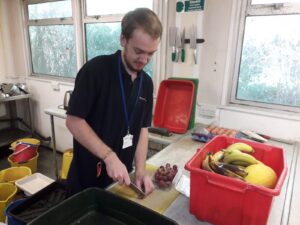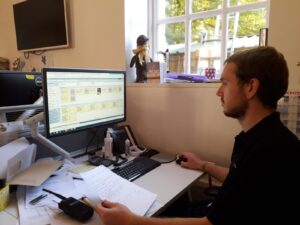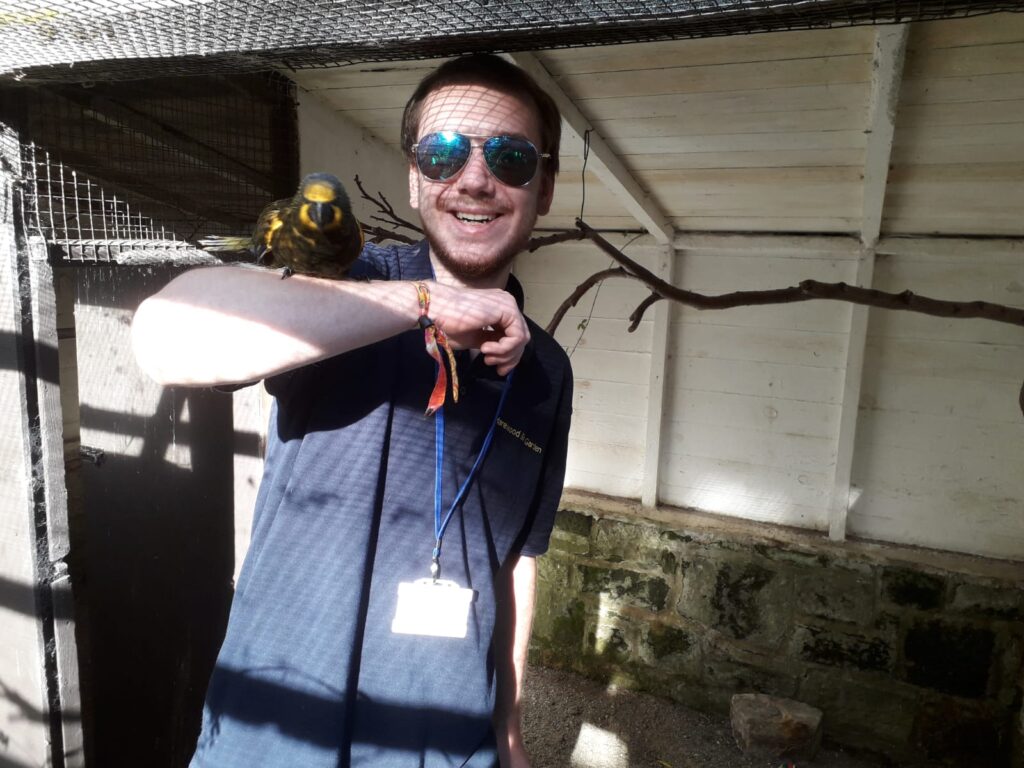In August, Joel joined Harewood as a Bird Garden Intern. In our latest blog, he reflects on how he came to intern for Harewood, an average day on site and shares his plans for the future.
I’m Joel and I worked as a Bird Garden intern at Harewood in August. I grew up in and attended schools in East Leeds. This summer I graduated from the University of Leeds with a degree in Environmental science, which included a year abroad at Osaka university in Japan. My degree was centred around the interactions between the Earth systems and how human activity has and continues to impact the environment we live in.
During my studies at university, I volunteered at RSPB Fairburn Ings. This consisted largely of site management, ensuring that the reserve was suitable for both guests and wildlife.
My ideal career would have a good balance of field and office work, perhaps as a consultant ecologist with a specialisation in insects. I would like my work to be centred around conservation, creating environments in which humans and nature can coexist.
The Plus Programme, part of the Access to Leeds scheme at my university, made me aware of this opportunity in an emailed newsletter. The plus programme gives extra support and opportunities as well as events to students from underrepresented backgrounds at Leeds University. The application process, as the first (of hopefully many) Bird Garden intern at Harewood, was straightforward. I just sent off my CV and attended a 30-minute informal interview.

A typical day starts off with chopping up fruit and veg for the farm animals and birds. Then after clean-up and a quick tea break, it’s feeding time. Feeding the animals involves checking the enclosures and furnishings are in good condition and ensuring they have access to clean water. It is also important to check the condition of the animals and monitor their behaviours. Knowing individual animals, as well as typical behaviour for species, may indicate something- such as breeding or illness. Understanding this means a healthy and happy collection, as the keepers can act accordingly.

The afternoon sometimes involves a miscellaneous task, which ranges from cleaning out enclosures, monitoring animal introductions to moving bits and pieces about the bird garden. Then it’s to the office for some much-appreciated time off of my feet. Office work revolves around ZIMS, a zoo collection management software. ZIMS functions as a pseudo bird garden news, in which the day’s occurrences are reported. Animal movements, births, deaths, behaviours, vet reports, worming and weights all need to be recorded. Keeping records of the animals and their enclosures gives us a good knowledge base to refer back to. Then after that, it’s home time.
My favourite parts about being the Bird Garden intern was the practical experience I gained, as well as the knowledge the team shared with me whilst doing this. I enjoyed learning about the behind-the-scenes aspects of managing a zoo. What works best isn’t always simple and straightforward, when working with animals your approach has to be tailored to the individual. Seeing and learning about this process surprised me and was super interesting. The team was always happy to share their knowledge with me and answer any questions I had. Feeding the animals was also really fun. The Striated Caracaras and Andean Condors were good to feed, as they are very keen feeders, albeit a bit intimidating. The Brown Lorries were very entertaining to feed too, and I loved that as I spent more time with them during working here, they began to trust me more, to the extent that they make it difficult for me to leave their enclosure without them on me. It was also a bit disconcerting saying hello to them, and having them answer me back!
After I finish this internship, I will be learning to drive so that I am able to find a job as a graduate ecologist. Working at Harewood has certainly enhanced my skill set and will definitely aid me in my search.
